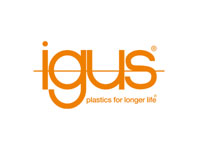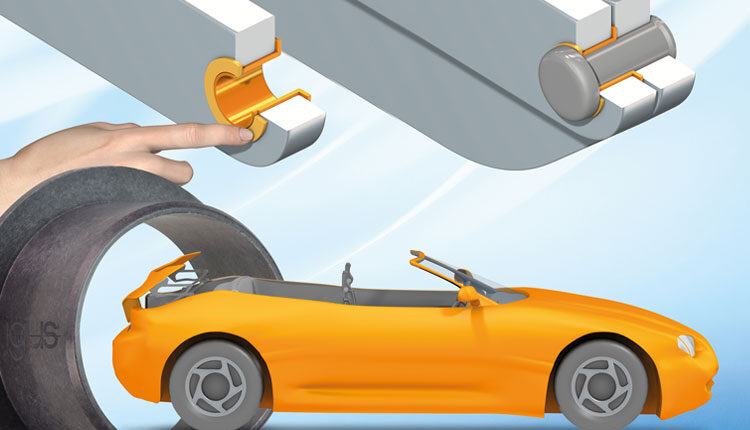Clearance-free multi-link hinges with self-calibrating iglidur plain bearings for automotive applications
igus develops the new, highly wear-resistant iglidur F300 material for e-coated assemblies
In practice, it is not easy to cost-effectively produce clearance-free multi-link hinges for spoiler kinematics and soft-top and hinge systems. Frequently only roughly punched holes with a limited amount of fine cuts in the guides combined with cold extrusion rivets require costly bearing recalibration. With its plain bearings made of tribologically optimised plastics, such as the new electrically conductive iglidur F300 material, igus offers a technically better solution that costs less. In the e-coating process, the bearing recalibrates itself and also prevents corrosion.
Wind, sunshine and a lonely winding road. This is how you imagine a relaxed ride in a convertible. But in wind, rain and city traffic, the driver is happy to be able to close the car’s top quickly. This requires low-clearance multi-link hinges. The challenge with the aerodynamic components lies in their manufacture. In practice, the holes in the guides are only roughly punched, with a limited amount of fine cuts. In addition, there are rivets and plain bearings, which also have to operate without clearance throughout the entire system to avoid noise and rattling. Metallic rolled PTFE bearings have hitherto been the default, but they have to be recalibrated with great effort. This is where igus, the motion plastics specialist, comes into play with its plastic plain bearings, such as those made of the new iglidur F300 material. “The disadvantage of plastic plain bearings – that they become soft at high temperatures – is an advantage here,” explains Markus Feth, Head of Automotive at igus.
Self-calibration due to high temperatures
The bushing made of the iglidur F300 material is mounted with pretension in the bearing point. It undergoes cathodic dip painting, a process for even surface coating. For this, igus has developed the new iglidur F300 material to be electrically conductive so that it doesn’t insulate the individual parts of the hinge from one another. The conductivity is designed to be sufficient for a good coating result. However, the igus bearings are more insulating than metal plain bearings, so there is no significant corrosion in the usual OEM salt spray and climate change tests. This is especially important for aerodynamic components, such as spoiler kinematics and adjustable diffusers. The material is also extremely wear-resistant and withstands the special thermal requirements of the subsequent burning process. The bearing recalibrates itself during the drying process at 180 to 220 degrees. Despite roughly punched holes and cold-bolt extrusion, the customer thus receives a low-clearance bearing that operates smoothly.



